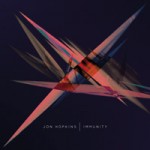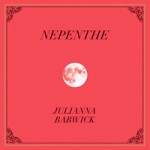Music Reviews, 08/2013
This issue
Jon Hopkins, Immunity
Julianna Barwick, Nepenthe
Laura Marling, Once I Was an Eagle
Deafhaven, Sunbather
Speedy Ortiz, Major Arcana
Jon Hopkins | Immunity
Domino
by James Brubaker
 Normally I don’t like to engage with press materials about new albums because, well, press materials so rarely get things right. In the rare instance that an album’s press release does do a fine job of accurately portraying an album, I catch snippets of ideas and phrases from said release filtering into my consciousness while I’m listening and reviewing. As irritating as that can be, those rare instances make me feel happy for the PR person who wrote the release, because that person is good at his or her job, and it also makes me happy for the artist for finding talented professionals who do a good job of representing the artist’s work.
Normally I don’t like to engage with press materials about new albums because, well, press materials so rarely get things right. In the rare instance that an album’s press release does do a fine job of accurately portraying an album, I catch snippets of ideas and phrases from said release filtering into my consciousness while I’m listening and reviewing. As irritating as that can be, those rare instances make me feel happy for the PR person who wrote the release, because that person is good at his or her job, and it also makes me happy for the artist for finding talented professionals who do a good job of representing the artist’s work.
Now, as I sit down to write about Jon Hopkins’ latest album, Immunity, I find that the press release keeps springing to mind, not for how good it is, but for how terribly it represents the album. According to the press release, Immunity is a “multi-faceted beast,” that was “Inspired by the arc of an epic night out.” These words, “beast,” and “epic” imply something grand and ferocious about this album’s size and scope, and while the album is certainly an impressive accomplishment, there is nothing beastly or epic about it, no hard-club bangers from an “epic night out,” or monstrous bass drops or anything else that sounds even remotely beastly. Instead, what Hopkins has achieved with Immunity is a quiet, elegant techno album that is both contemplative and infectious.
Album opener “We Disappear,” begins with the sound of a door closing, then fades into a gloomy, city-at-night beat that does sound like a slow escalation to a night out. This build extends into the album’s second track, “Open Eye Signal,” which does get the proceedings moving, a bit, thanks to its sharp synth lines and driving beat.
So, maybe the first two tracks on Immunity vaguely resemble a “night out,” if not necessarily an “epic” one. But the biggest sin of the album’s press release is its declaration that the album “Peaks with ‘Collider,’ a huge, apocalyptic, techno monster and dissolves with the quiet, heartbreakingly beautiful closer, ‘Immunity’…” Now, “Collider” is a “big” song, and it builds on tricky beats, bulbous synths, and distant ambience to achieve an almost claustrophobic sense of space, but calling the song the album’s peak, then skipping ahead to the album’s closer, feels dismissive of three of the album’s strongest tracks. “Abandon Window,” “Form By Firelight,” and “Sun Harmonics,” positioned between the “peak” of “Collider” and the album’s closer, work as a bracingly quiet trio that somehow manage to be sexy and somber at once. “Abandon Window” blends gorgeous keyboard work with aching ambience to come off as downright despairing. “Form By Firelight,” is a slinky little number that shifts between a searching, circuitous beat and passages of quiet, ambient drones. And “Sun Harmonics,” which is probably the real peak of Immunity, is a sun-rise in song form, a lovely, subtle pulse, gently layered with soft synth tones, and blissful white noise.
Of course, after spending a few hundred words quibbling with the press release, I have to give it some credit. Despite its early misguided characterizations of Hopkins’ work, the release does eventually describe the album’s dance music as “natural and unforced,” even going so far as to call it “The most human electronic album you’ll hear this year.” Both of these observations are accurate, and both speak to what makes Immunity such an exceptional piece of craftsmanship—these songs feel organic and real. Thanks to Hopkins’ use of ambient noise and real sounds, each track, here, feels lived in, as if performed in an actual space. It is in this space that listeners are able to inhabit Hopkins’ lush arrangements and get lost in the composer/arranger’s meticulous ear for detail.
Structurally, I can buy the press release’s assertion that Immunity is inspired by the arc of a night out, but it’s more the kind of night that happens a few years on from LCD Soundsystem’s “All My Friends,” when the controls are a little worn out from being set to the heart of the sun one too many times, and so the night consists of a little bit of dancing, then taking in the sights and sounds of the city at night, before finally sitting by a fire until the sun rises. Despite what the press release would have us think, there are no beasts or monsters on Immunity, and the only thing epic about the album is Hopkins’ heroic willingness to chart the quiet spaces between and after all the dance floors with as much rigor and conviction as the musicians who chart the dance floors themselves.
Julianna Barwick | Nepenthe
Dead Oceans
by Brian Flota
 Julianna Barwick’s Nepenthe, the follow-up to her marvelous second album The Magic Place (2011), inhabits many of the same ethereal realms as its predecessor. On that record, one of my favorites of the last few years, Barwick combines her densely layered vocal harmonies with spare loops and brief piano motifs. Surprisingly, this restrictive musical approach yields a verdant kind of daydream music, akin to the spacey after-effects of a mild concussion. It reminds me of those abundant, epiphany-depicting snippets found in the two most recent Terrence Malick films (The Tree of Life and To the Wonder) where his characters kinetically frolic inside teeming shrouds of white muslin curtains. Musically, it shares some of the same spaces as Brian Eno’s Ambient 1: Music for Airports (1978) and Slowdive’s Pygmalion (1995) yet always flirts dangerously with the New Age cliches of Enya. Fortunately, it avoided these snares.
Julianna Barwick’s Nepenthe, the follow-up to her marvelous second album The Magic Place (2011), inhabits many of the same ethereal realms as its predecessor. On that record, one of my favorites of the last few years, Barwick combines her densely layered vocal harmonies with spare loops and brief piano motifs. Surprisingly, this restrictive musical approach yields a verdant kind of daydream music, akin to the spacey after-effects of a mild concussion. It reminds me of those abundant, epiphany-depicting snippets found in the two most recent Terrence Malick films (The Tree of Life and To the Wonder) where his characters kinetically frolic inside teeming shrouds of white muslin curtains. Musically, it shares some of the same spaces as Brian Eno’s Ambient 1: Music for Airports (1978) and Slowdive’s Pygmalion (1995) yet always flirts dangerously with the New Age cliches of Enya. Fortunately, it avoided these snares.
Nepenthe is an appropriate title for Barwick’s third album. The ancient term refers to an elixir or intoxicant that creates a lacuna in ones memory to help them forget painful memories. There are a couple of immediately striking things about the new album. Barwick has refused to alter her aesthetic. By that, I mean there is still an abundance of eerie but lovely vocal harmonies, the utilization of loops, and minimal percussion. But she has made slight modifications. The production possesses more clarity here than it did on The Magic Place. While this generally benefits the music found on Nepenthe, there are a few times where the clarity—the kind of unfortunate clarity that allows one to see the transparent wires holding up the Cowardly Lion’s tale on Blu-Ray copies of The Wizard of Oz when viewed on HDTV screens—sends Barwick’s music hurtling down to Middle Earth. You know, the one where Enya sings to Hobbits? This is especially apparent on “The Harbinger” and “Forever.” Fortunately, these New Ageisms take up less than a fifth of the album’s running time.
For the most part, the tracks on Nepenthe take few chances as it relates to the distinct approach she perfected on The Magic Place. One track that distinguishes itself from the pack is “Crystal Lake.” While it offers few variations structurally, there is a repeated piano figure whose pitch is manipulated to resemble the effect of someone intermittently putting their finger lightly on a record as it spins on a phonograph. This yields what might be her most disorienting song to date. Because Nepenthe offers such few challenges or variations to the music found on The Magic Place, I can’t say it’s her best effort to date. On the other hand, its overall-improved sonics and further exploration of her already-established aesthetic generate some awfully lovely music. Fans of her previous work will find little to be disappointed about here.
Laura Marling | Once I Was an Eagle
Ribbon Records
by Joshua Cross
 Listen up, fellas. Laura Marling will effing eat you. On “I Was an Eagle,” Marling sets a former lover straight: “When we were in love (if we were),” she declares, “I was an eagle and you were a dove. … You were a dove, and I rose above you and preyed.”
Listen up, fellas. Laura Marling will effing eat you. On “I Was an Eagle,” Marling sets a former lover straight: “When we were in love (if we were),” she declares, “I was an eagle and you were a dove. … You were a dove, and I rose above you and preyed.”
Around the release of Marling’s most recent album, 2011’s A Creature I Don’t Know, the then-21-year-old talked about a newfound confidence as a songwriter. She told The Guardian that while her first two albums had been collaborative efforts with other musicians and producers – primarily men – she wanted to demo Creature “before anybody else [got] their grubby mitts on it.” She wanted the album to be hers and sound the way she knew it should.
Once I Was an Eagle represents a culmination of Marling’s efforts to free herself and declare her individual agency and identity. The first five tracks make up a suite, flowing seamlessly from one to the next, and, on the surface at least, they focus on extracting the speaker from the typical lousy relationships we all find ourselves mired in from time to time. On “Breathe,” she finally tells the lover, “When you wake, you’ll know I’m gone. Where I’m going, there’s no one, so don’t follow me.” She is leaving, not running toward some other, but leaving to be alone, to be herself.
But this is more than just an “I’m over you” message. For a female singer-songwriter whose young age has been the primary focus of most reviews and features, this is a feminist statement of intent. Marling is not a little girl, and she’s tired of being treated like one. “Every little girl is so naïve, falling in love with the first man that she sees,” she sings on the title track. But that’s not her. “I will not be a victim of romance,” she continues. “I will not be a victim of circumstance; chance or romance or circumstance, or any man who could get his dirty little hands on me.” The operative word here is “victim,” and Marling is far too secure to play the victim. On the album’s first single, “Master Hunter,” she states, “I cured my skin, now nothing gets in.” She feels protected, impenetrable, and fierce. She is the hunter, the eagle, and never the prey.
The album’s production also demonstrates Marling’s independence. Whereas she worked with a full band on her first three albums, Marling took to the studio to record Eagle with the help of only a cellist and producer Ethan Johns, who provides percussion, keyboards, and other instruments to these tracks. Marling recorded her vocals and guitars live in one take, though one would never guess that from the album’s overall sound of polish and sheen.
As a whole, Once I Was an Eagle represents a more confident, mature Marling, not only lyrically, but musically as well. The classical guitar in “Love Caster” and the jazzy “Undine” show off Marling’s chops, which put her in company with Nick Drake and Elliott Smith, to compliment the common comparisons to Joni Mitchell. While some critics have found the album’s overall length – 16 tracks clocking in at 64 minutes – daunting, this is the most coherent, focused album yet from one of the strongest folk musicians of the day. Eagle is the pinnacle of her career to date, but one gets the sense that this is not quite Marling’s peak.
Deafhaven | Sunbathers
Deathwish Inc
by Nathan Knapp
 Sunbather, the latest album from California metal band Deafhaven, is an album so preternaturally unconcerned with where it will be shelved or who will like it that it warms the heart, an album that comes at its listener without apologizing for what it is—and what it isn’t.
Sunbather, the latest album from California metal band Deafhaven, is an album so preternaturally unconcerned with where it will be shelved or who will like it that it warms the heart, an album that comes at its listener without apologizing for what it is—and what it isn’t.
Tending to be curmudgeonly suspicious of anything that gains a certain amount of hype from people with curated good taste (read: anything that the Pitchfork machine puts its guns behind), and having never really been able to let go of the high school dichotomy of selling out vs. staying “true,” I’d normally be overly suspicious of a band with as much traction as Deafhaven have gained. Especially when that band, like Deafhaven, got its start in the black metal scene.
On the other hand, so many metal bands have been undone either by allegiance to or disavowal of metal’s own very particular orthodoxies that it’s always a surprise—at least for me—that innovations happen at all. The subcategories are endless and full to the brim already. A band’s roots in one or another of metal’s subgenres often dictate their entire careers, whether they come out of black or death or prog or metalcore or hardcore or thrash or crust or doom or whatever label that the music media attaches to them. Some bands, like Converge, thrive and continue within their own established world, attaining a sort of inner-clan legendary status. Others—take Mastodon, for example—shift from dingy barrooms full of smoke into stadiums full of bright air.
And then you have Deafheaven, who have been working under a spotlight since their first full-length, Roads to Judah, made a bunch of year-end lists in 2011. A mere four tracks long, that album impressively married a black metal framework with long, breakneck song structures to a shoegaze gauze. And while that album has its bright points—chiefly “Violet” and “Unrequited”— in hindsight, it looks like a practice run for Sunbather, which feels like an entity all its own.
Sunbather swings in a high arc over its peers. The album’s slow, quiet sections (see “Please Remember” and the chilling “Windows”) are as important as its dark, plosive moments. It sacrifices neither George Clarke’s high-toned roar nor its melodic, dream-like auroras. There’s no compromise here, but rather a wide-angle generosity.
Deafheaven deserves every ounce of hype they’ve so far received. Although they’re not the first to wed high-minded emotion with scorching distortion—see little-known Swedish band Suffocate For Fuck Sake’s excellent but ridiculously titled 2008 effort, Blazing Fires and Helicopters On the Front Page of the Newspaper. There’s a War Going On and I’m Marching in Heavy Boots—but Deafheaven is the first to do so to such a large audience. Pitchfork’sBrandon Stosuy writes that this album “has the ability to capture the attention of people who don’t normally listen to heavy music,” and I certainly agree with him. More importantly, though, they’ve expanded to both the worlds of metal-purists and the Pitchfork-reading, SXSW-going folks without losing an ounce of muscle or artistry, and done so with high style, producing a beautiful, haunting record from start to finish.
Speedy Ortiz | Major Arcana
Carpark Records
by James Brubaker
 It’s tempting to approach Speedy Ortiz’s Major Arcana as another nostalgia-steeped guitar rock record wearing its debt to bands like Pavement, Liz Phair, and Dinosaur Jr. on its sleeve—as one more casualty of indie rock’s anxiety of influence. To describe, or dismiss Speedy Ortiz and Major Arcana in such a fashion, though, would be thoroughly misguided. While the band’s sound is certainly inspired by alt-guitar heroes of the past, on Major Arcana Speedy Ortiznever succumb to the anxiety of their influences and instead channel those influences into a sharp collection of songs driven by an exciting, raw energy.
It’s tempting to approach Speedy Ortiz’s Major Arcana as another nostalgia-steeped guitar rock record wearing its debt to bands like Pavement, Liz Phair, and Dinosaur Jr. on its sleeve—as one more casualty of indie rock’s anxiety of influence. To describe, or dismiss Speedy Ortiz and Major Arcana in such a fashion, though, would be thoroughly misguided. While the band’s sound is certainly inspired by alt-guitar heroes of the past, on Major Arcana Speedy Ortiznever succumb to the anxiety of their influences and instead channel those influences into a sharp collection of songs driven by an exciting, raw energy.
Much of the press surrounding Speedy Ortiz, in the lead-up to Major Arcana’s release, has centered on songwriter, singer, and guitarist Sadie Dupuis. By and large, this makes sense: the band’s first release, 2011’s The Death of Speedy Ortiz, was a gloriously sloppy, lo-fi collection of gritty, home-recorded, guitar pop performed entirely by Dupuis. Add to that Dupuis’ penchant for scathing lyrical precision and tightly wound vocal melodies—at times swerving over and under the rhythmic crunch of guitars and drums, at others crashing straight through them—and it’s easy to see why so much of the press focuses on Dupuis. That being said, a big part of why Major Arcana is such an infectious album lies in the big giddy performance of the full band. That is to say, while The Death of Speedy Ortiz was a fun and satisfying release in its own right, the addition of the full band, and the requisite personalities that come with each member, on Major Arcana, has dramatically elevated the energy of Dupuis’ songs by creating that rarest of rare brands of anarchic, full-band alchemy.
This alchemy is the album’s fundamental charm. Sure, the band is tight, shifting from grim, post-hardcore melodicism to a sticky punk crunch on “Tiger Tank,” but in the thick of the crunch, when Dupuis’ and Matt Roubidoux’s guitars snarl and struggle with Darl Ferm’s massive bassline, and Mike Falcone’s explosive drumming, the song threatens to, but doesn’t, come apart. The weight of so many heavy performances coming together at once lends the song a compelling energy, as if one piece of the arrangement could burst free at any moment—it’s this push and pull that makes the song exhilarating. We hear the same tensions at the end of “Gary,” throughout all of up-tempo numbers “Fun,” and “Cash Cab,” and through the slow-burn build and guitar squalls on album closer “MKVI.”
Even in Speedy Ortiz’s slower, more melodic moments, though, these songs are characterized by a fluid and rhythmic sense of motion, as heard in the slippery guitar lines of “Hitch,” the understated not-quite interlocking guitars of “Pioneer Spine,” and perhaps most surprisingly, the gorgeous sea-sick sway of “No Below.” Of course, it is also in these quieter moments in which Dupuis’ Malkmus-inspired dead-pan melodies come to the fore, carrying with them her unique brand of clever, slightly-askew lyrics.
In one of the quieter moments on “Tiger Tank,” Dupuis sings, “Don’t even care if they take my legs/I’ve limped before, I can limp again”—a refreshingly direct burst of defiance. On “Gary,” we see an uneasy bit of self-probing: “I have seen the art of my stupid counterpart, the proportions wrong/Every line, I’m sure, the erased marks like a sore thumb, swelling and cumbersome.” And then there is the surprisingly earnest and lovely, “No Below,” which tells the story of a character abandoned by friends’ in her youth, and coming to later accept that earlier abandonment, resolving that, “Everything fucked up that we felt before/I’m glad for it all if it got us where we are.” While such a sentiment might read as, well, sentimental in other contexts, here it serves to emphasize the vulnerability underlying all of the breathlessly direct emotion and odd imagery running through Dupuis’ lyrics, even when one speaker talks about getting her “dick sucked on the regular,” on the raucous “Fun,” or another sings “He wants to burn my all my candles but it isn’t for love,” as on the restless and angry “Plough.”
Ultimately, what makes Major Arcana such a compelling album is Speedy Ortiz’s ability to draw on their refined skills and abilities—the performances are tight, the lyrics meticulous in their precision—to create something that feels as if it is the opposite of refined. Dupuis’ lyrics are compelling due to their directness and willingness to openly engage the uncomfortable and awkward, and the band’s performances spin their own precision into a raw and exciting whole that feels anything but safe. This lack of safety gives Major Arcana a sense of danger, as if each song could fall apart at any minute, which ultimately makes the album a weird, dark, but thrilling listen.
